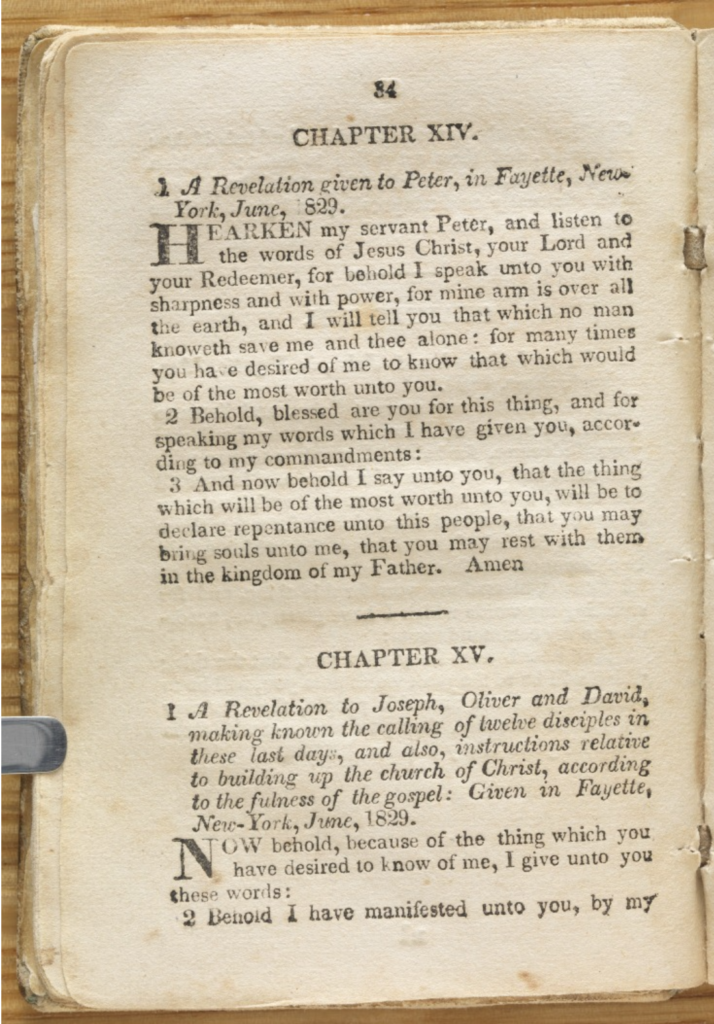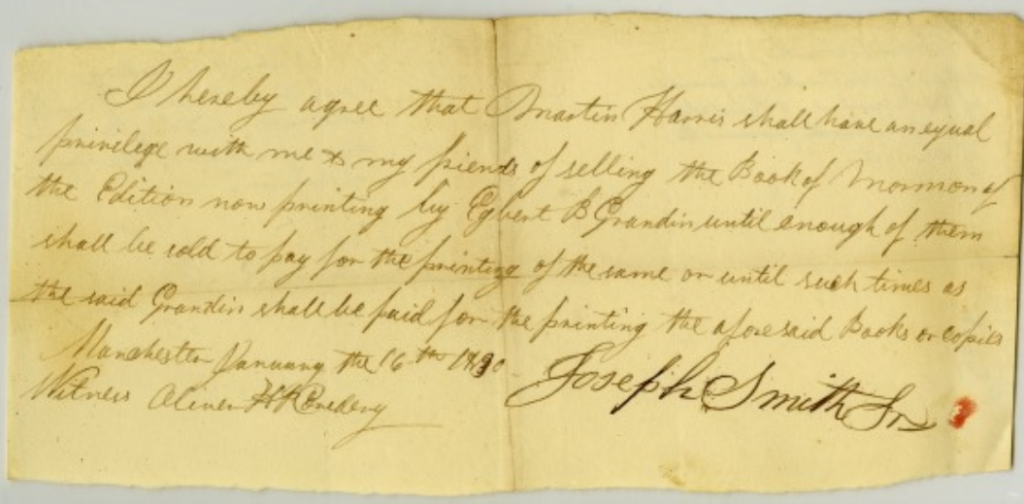Section 18

The Lord revealed section 18 because Joseph, Oliver Cowdery, and David Whitmer desired to know how to build the Church of Jesus Christ, something they knew was coming but they had never done before.[1] The Lord tells Oliver specifically to rely on what he has learned from the Book of Mormon manuscript he has penned as Joseph translated. Since he knows by the Spirit that it’s true, he can use it to compose a foundational document for the church that is soon to be restored. If they build the church on this foundation, hell cannot stop them.
This revelation is the first in the Doctrine and Covenants to refer to apostles, saying that Oliver and David “are called” to that calling (D&C 18:9). What should apostles do? “Remember the worth of souls is great in the sight of God.” Based on that premise—the value to God of each individual soul—the revelation gives a rationale for repentance that is centered in the sacrifice of Jesus Christ. This part of the revelation sounds like a sacred equation: the value of each soul is directly proportionate to the infinite atonement of Jesus Christ. He conquered death to bring the repentant to him. He feels great joy in repentant souls. Truman Madsen had this revelation in mind when he taught, “If souls are of value in direct proportion to the concern and sacrifice of our Redeemer, then we know that in the eyes of the Father and the Son, your soul—even yours—and mine—even mine—is of infinite worth.”[2]
That is the revealed reason for Oliver and David to cry repentance. If they spend their whole lives at it and only a single soul repents, the effort will be worthwhile. Their joy with that soul will be great in God’s kingdom. How much greater joy, then, to help many repent? So they are to follow the Book of Mormon in preaching the law of the gospel with faith, hope, and charity by inviting all mankind to come to Christ and assume his name, becoming his.
After nearly two millennia, section 18 commissions new apostles.
The Lord prophesies their calling. Then, beginning at verse 31, he speaks directly to them, promising grace sufficient to save them if they choose to meet his covenant conditions. Oliver and David are charged to “search out the Twelve” by discerning their godly desires, manifest in their behavior (D&C 18:37-38). The Twelve, in turn, are to act on their revealed instructions. A quorum of twelve would not be called for nearly six more years, but this revelation sets apostles Oliver Cowdery and David Whitmer to the task of selecting the members of that quorum and then speaks to them directly.
What does the Lord emphasize when he commissions apostles, when he gives them their job description, their marching orders? He teaches them that the atonement, the price paid, makes each soul of infinite worth in God’s sight. Based on that truth, he commissions the apostles to tell every soul to repent, to obey the law of the gospel, to become one with Christ by assuming his name.
Based on their commission in Section 18, modern apostles emphasize how the Savior’s atonement gives infinite value to each soul.
“If we could truly understand the Atonement of the Lord Jesus Christ,” said Elder M. Russell Ballard, “we would realize how precious is one son or daughter of God. . . . . We would strive to emulate the Savior and would never be unkind, indifferent, disrespectful, or insensitive to others.” Elder Ballard concluded, “It was Jesus who said, ‘If . . . you should labor all your days in crying repentance unto this people, and bring, save it be one soul unto me, how great shall be your joy with him in the kingdom of my Father!’ (D&C 18:15). Not only that, but great shall be the Lord’s joy in the soul that repenteth! For precious unto Him is the one.“[3]
Section 19

Martin Harris was “one of the most respected farmers in Wayne County,” a prosperous, property-owning Palmyran since 1808.[1] In summer 1829, Martin and Joseph agreed to terms with a Palmyra printer named Egbert Grandin to publish the Book of Mormon. It was a controversial book and they wanted to print a large run of 5,000 copies.
Martin led the negotiations and planned to pay for the printing, but he balked when Grandin refused to begin work until he had security for the entire payment.[2] They worked out an agreement in which Grandin would print and bind all 5,000 copies of the book for $3,000, with Martin putting up more than 150 acres of land as collateral. That’s when Martin “staggered in his confidence.”[3] He would have to mortgage all the land he owned outright. The marvelous work halted for most of the summer.
Martin worried that no one would buy the books and he would lose his farm.
“I want a commandment,” he told Joseph, “I must have a commandment.” So Joseph asked and the Lord gave a commandment, section 19.[4] In a word, the commandment was repent. Frequent, intense repetition of I command and repent dominate this text. It offers astonishing autobiographical insight into the Savior’s atonement. It begins in the voice of the Almighty Christ. First, he clarifies a mystery, or a common debate at the time about whether God’s punishment would last forever or not. Didn’t the word eternal obviously mean never-ending, proponents might argue. Not necessarily, the Lord answers. Consider that it can be a qualitative measure as well as a quantitative one. The acts of Christ’s suffering and being resurrected didn’t last forever, and yet they have eternal consequences. Punishment, perhaps, can be limited in duration and yet lasting in effect. Moreover, Christ says, eternal “is more express” than other words (D&C 19:7). It makes the intended point powerfully.
With that the Savior begins to make his intended point powerfully. He repeatedly commands Martin to repent because Christ suffered exquisitely so that he could. This is the best autobiographical description of the Savior’s atoning suffering in the scriptures. It is wrenching, beautiful, and powerful. “It is more express than other scriptures” (D&C 19:7). Compare section 18, for example, where the Savior speaks briefly and modestly in the third person voice to describe how he suffered the pain of all so that all might repent (DD&C 18:10-13). It’s the same doctrine declared by the same Christ but in an entirely different voice and tone.
Section 19 is adapted to Martin’s present predicament, which Christ knows how to address.
Throughout section 19 there is subtle allusion in which Christ compares himself to Martin implicitly. As Martin wrestles with whether he should keep his promises, and whether the sacrifice asked of him is too great, the Savior declares his character: he keeps promises. He made the infinite sacrifice. Where Martin is concerned with carnal security, the Savior shows contempt for covetousness. Where Martin is coveting his own property, the Lord compares it to the priceless testament of Jesus Christ, the “Book of Mormon, which contains the truth and word of God” (D&C 19:26).
This revelation reoriented Martin Harris. He grasped what the Lord was saying so expressly. He learned to let this commandment suffice and not ask again (D&C 19:32). He obeyed the Lord’s command to “not covet thine own property, but impart it freely to the printing” (D&C 19:26). He mortgaged his farm on August 25, paying Grandin in full.[5] Once the paperwork was finished, Grandin’s employees began printing. The marvelous work was back on track.
Section 18 notes
[1] “Book of Commandments, 1833,” p. 34, The Joseph Smith Papers, accessed July 23, 2020, https://www.josephsmithpapers.org/paper-summary/book-of-commandments-1833/38.
[2] Truman G. Madsen, “The Savior, the Sacrament, and Self-Worth,” Address given at the 1999 BYU-Relief Society Women’s Conference, https://womensconference.byu.edu/sites/womensconference.ce.byu.edu/files/madsen_truman.pdf.
[3] Elder M. Russell Ballard, “The Atonement and the Value of One Soul,” General Conference, April 2004, https://www.churchofjesuschrist.org/study/general-conference/2004/04/the-atonement-and-the-value-of-one-soul?lang=eng.
Section 19 notes
[1] Pomeroy Tucker, Origin, Rise, and Progress of Mormonism (New York, 1867), 41, 50.
[2] John H. Gilbert, Memorandum, 8 Sept. 1892, photocopy, MS 9223, Church History Library, Salt Lake City, https://catalog.churchofjesuschrist.org/assets/162efea4-cb3f-459f-937f-949b3995e572/0/0. “Mormon Leaders at Their Mecca,” New York Herald, 25 June 1893, 12.
[3] Pomeroy Tucker, Origin, Rise, and Progress of Mormonism: Biography of Its Founders and History of Its Church (New York: D. Appleton, 1867), 51.
[4] Joseph Knight, Sr. Reminiscences, no date. MS 3470, Church History Library, Salt Lake City.
[5] Martin Harris, Mortgage to Egbert B. Grandin, 25 August 1829, Mortgages, Liber 3, 325, Wayne County Clerk’s Office, Lyons, New York.
The post Come, Follow Me: Doctrine & Covenants 18, 19 appeared first on Steven C. Harper.
Continue reading at the original source →



